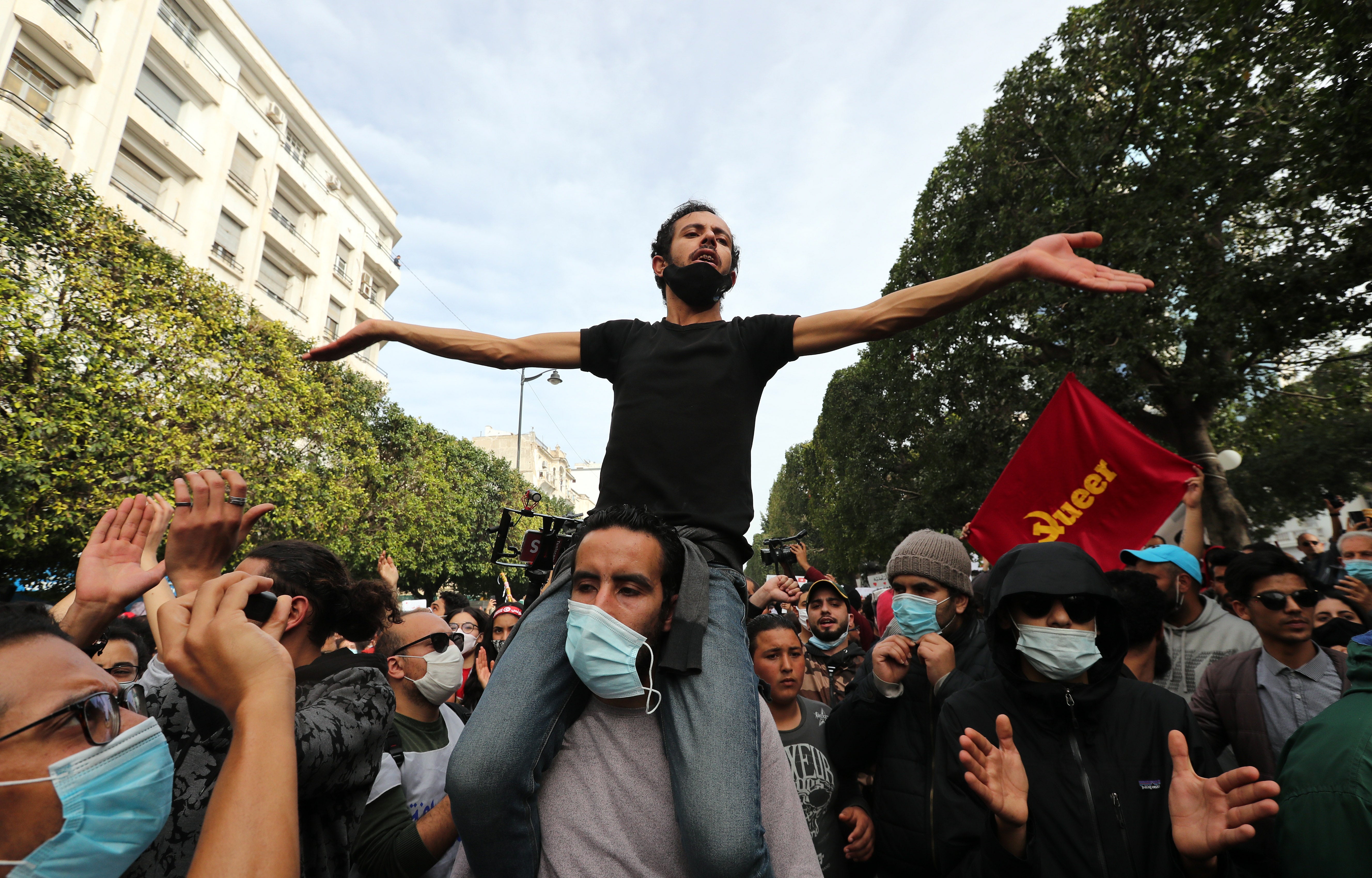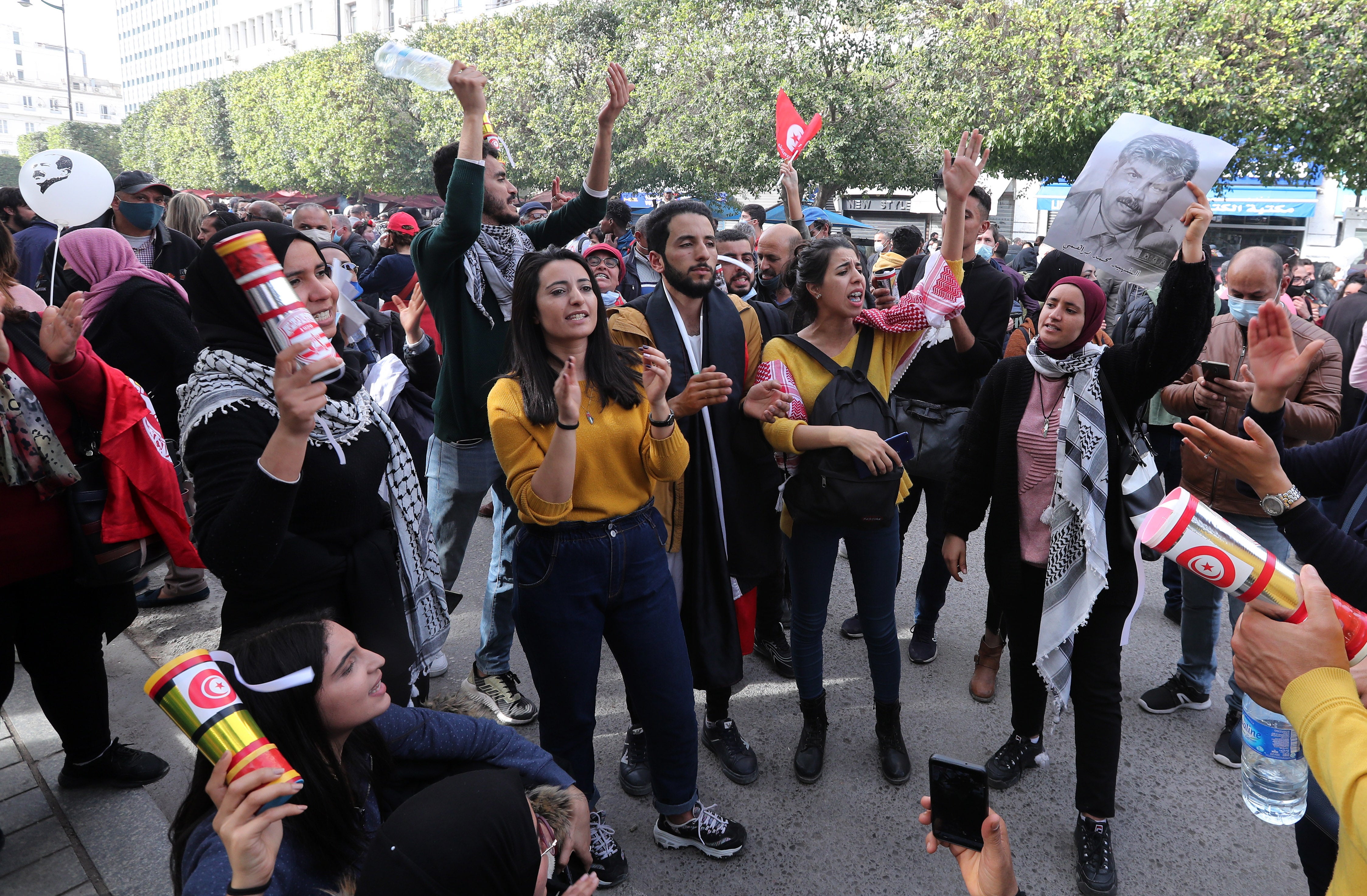Defying threats and violence, Tunisia’s queer community take central role in anti-government protests
As anti-government protests continue in Tunisia, one community has been to the fore, reports Simon Speakman Cordall in Tunisia

Tunisia is hardly a stranger to protest. From the mass demonstrations that toppled autocrat, Zine El Abidine Ben Ali in 2011 to the present, mass unrest has become a near annual fixture of Tunisian street life.
This year has been little different. Faced with a rising tide of social movements calling for economic development, jobs and an end to the financial stagnation that has dogged the country for over a decade, the government announced a strategic four day coronavirus lockdown, which would coincidentally fall over the ten year anniversary of the revolution.
If the strategy was intended to calm the mood, it backfired.
Protests, spreading from the rural northern regions of Siliana to the poverty stricken and overlooked towns of the country’s interior and the marginalised suburbs of the major cities took hold.
With crushing regularity, young unemployed men on the city’s outer reaches would head out into the streets to wage brutal nightly battles against the lined ranks of the country’s police.
Inevitably, protests spread to the city centres, where diverse groups of young activists took to the streets to demonstrate against police violence and the powerlessness of the government in the face of the country’s slow slide towards penury.
Across the spectrum, youths barely able to remember a time before the revolution took to the streets carrying flags bearing the hammer and sickle of the Soviet Union, calling for the legalisation of marajuana and, within an avowedly conservative country, proclaiming the defiant presence of Tunisia’s queer minority among the protesters.
The backlash against all, but the queer community especially, has been brutal.
While homosexuality itself isn’t illegal in Tunisia, sodomy is. A colonial French statute in Tunisia’s penal code dating back to 1913 criminalises the act between consenting adults. Another statute, outlawing "outrages against public decency" has also been used to prosecute Tunisia’s transgender community.
The enforcement of both statutes has been seized upon with relish by the country’s police force, who have continued to use it to persecute Tunisia’s LGBTQI+ community, including using anal tests as proof of sexual activity among males. .
26 year old queer activist Mohammad, who took part in the protests, speaks of the harassment they have received since the demonstrations. They speak of the telephone threats from unknown numbers that the app True Caller later traced back to the country’s Minister of Interior.
"You can’t seperate being a protester from being a queer activist," they told a translator, "My reasons for being there were as much about what it happening in the marginalised towns and districts as my own identity," they said, referencing their non binary sexuality.
Mohammad grew up in a small village in the mountainous region near el Kef, close to the Algerian border.
"I wasn’t conscious of my sexuality as a child. I would be round my aunts’ house, who I used to dress up, talk and dance with," they told a translator. "I started to grow aware I was different during puberty. I didn’t feel that I could be like either men or women, so I would go to the mosque and pray."
Attending mosque was wasn’t only about seeking answers through prayer. It was as much about finding somewhere isolated to think and seek ways not to stand out within Mohammad’s small and conservative village,
"It was a place no one was watching me and I could practice speaking in a more masculine voice," Mohammad said. Equally, "When I came back from school, I would go the long way, so I could practice walking like a male, putting my hands in my pockets to control my gestures," they said.
Mohammad has tried killing themselves three times.
However, while Mohammad was keen to stress that things have got better since they recently appeared on television to call out police brutality, for others, such as activist Rania Amdouni - who was unavailable for interview - things have grown worse. After establishing herself as a prominent presence during Tunisia’s street protests, the online backlash she has experienced has been comparted to an electronic lynching.
In addition to referring to Rania’s case, an HRW report released this week cited the police’s use of the protests as cover for the systematic crackdown on Tunisia’s queer community. Further to the threats of rape and death, officers are accused of doxing queer protesters identified during the protests and harrangiung them on social media.
The presence of Tunisia’s queer community during this latest round of demonstrations is as unusual as it has been a long time coming. A number of LGBTQI+ associations emerged after the revolution, assuming an increasingly confident and vocal voice within Tunisian society as time wore on, with an openly gay candidate running for President in 2019.
Nevertheless, as queer confidence has grown, so too have the forces of conservatism. In parliament, the self described ‘Muslim Democrats,’ Ennahda, hold a plurality. Elsewhere, in many of the country’s poorest neighborhoods, young men still talk openly of travelling to Syria to defend what they see as their faith.
Fuelling this is the undercurrent of poverty which, exacerbated by Coronavirus, has led to a pandemic of hopelessness. Last year, as political factions squabbled in the country’s parliament, record numbers of Tunisians took to the seas and emigrated clandestinely to Europe.
Before the pandemic, unemployment stood at around about 15%. However, among 15- to 24-year-olds the figure rises to 36%. With prices rising and the value of the national currency deteriorating with every year, poverty and hunger for many is a reality.
Nevertheless, despite their vulnerability to assault and official persecution, organisations such as Damj, which campaigns for the rights of Tunisia’s queer community, draw a direct line between their cause and those of the underrepresented and marginalised of Tunisia, including the angry young men of the suburbs.
For Saif Ayadi, a coordinator with Damj, the revolution belongs to them as much as it does anyone else. Sitting back in his chair in Damj’s offices in a run down backstreet near the city centre, he referenced one of the revolution’s slogans, "work, liberty and national dignity”.

"The main thing that has been said throughout the protests are work, which queer people are often precluded from, liberty, we as a community need to express ourselves and national dignity, after all, we’re Tunisians. We love this country," he said.
"Homophobia came to Tunisia in 1913, with the French," Saif’s colleague, Hamza Nasri Jridi explained, "There’s a Tunisian form of coexistence that’s quite different from that in Europe," he said, referencing the limits of shared experiences between Tunisian and western sexual minorities.
"I believe we belong to a third world queer community. There is a division between the global north and south. That’s why our issues are more similar to those in Venezuela or Cuba."
For now at least, Tunisia’s protests seem to have blown over. However, with the pandemic squeezing the economy and job numbers even further, few doubt that they’ll be back.
When they do, Damj and Tunisia’s queer community will once more be assuming their place opposite the police lines within the city centres.



Join our commenting forum
Join thought-provoking conversations, follow other Independent readers and see their replies
Comments